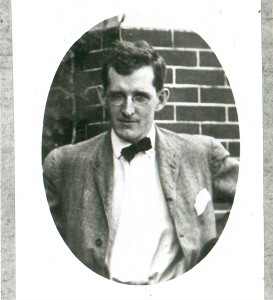Celebrating U of T health innovation
November 10/2017
By Elaine Smith
Three University of Toronto entities celebrating anniversaries this year have made major contributions in narrowing the gap between research and impact, making health care accessible to everyone, and improving health worldwide.
The year 2017 marks the 100th anniversary of Connaught Laboratories (now Sanofi Pasteur Canada), the 90th anniversary of the School of Hygiene (now the Dalla Lana School of Public Health) and the 70th anniversary of the Department of Hospital Administration (now the Institute of Health Policy, Management and Evaluation or IHPME). On November 15, the Vice-President of Research and Innovation, Vivek Goel, the Dalla Lana School of Public Health (DLSPH) Interim Dean, Adalsteinn Brown, and Faculty of Medicine Dean, Trevor Young, celebrated U of T health innovation with a panel discussion and reception at Hart House.
“Research isn’t good to society if it is locked up in the laboratory and doesn’t make its way out of conferences and journals,” Goel said. “If you have a treatment and know it can improve society, you want it to have impact.
“We know from many studies that as ideas move to policy, programs and services, it leads to stronger economies and societies.”
The Early Years
Dr. John Gerald FitzGerald, one of the university’s pioneers in bringing research from the lab to the public, first established a laboratory in a stable to produce diphtheria antitoxin to sell at cost to the Provincial Board of Health for free distribution. In 1917, his relocated, expanded lab became U of T’s Connaught Laboratories and University Farm, a base for producing a variety of lifesaving medicines.
The Connaught Lab drew the attention of the prestigious Rockefeller Foundation and with their support, U of T opened an expanded School of Hygiene in 1927, the third of its kind in North America, following Harvard and Johns Hopkins Universities. Together, Connaught and the School of Hygiene became a powerhouse for innovation and implementation of research advances to address infectious diseases.
The Department of Health Administration was established within the School of Hygiene in 1947, becoming the first hospital administration program in English-speaking Canada. It began working to improve health care in Canada by tackling the problems faced by health systems, providing research and education in areas such as leadership, policy and systems evaluation.
Moving Forward
In 1972, U of T sold Connaught Laboratories, realizing that drug production wasn’t part of its core mission of teaching and research. The sale allowed for the creation of the Connaught Fund with its endowment of more than $100-million. Each year, the university invests $4-million of those funds into the work of interdisciplinary, early career, and doctoral researchers, with an emphasis on meeting challenges facing global society. The Fund is distributed annually over five distinct programs as part of its ongoing commitment to innovation and implementation.
This legacy of innovation carries forward today through the work of myriad U of T researchers from the Faculty of Medicine, DLSPH and IHPME and elsewhere across the university, including professors Emily Seto, Leah Cowen and Laura Rosella. These three female innovators were front and centre at the November 15 celebration on a panel that will discuss narrowing the gap between research and innovation, drawing upon years of personal experience.
Seto, an Assistant Professor of Health Informatics at IHPME, researches mobile technologies to determine how patients with chronic diseases can become more engaged in their own care. For example, Medly, a telemonitoring system for people with multiple chronic conditions, has a smartphone app that monitors a patient’s blood pressure, glucose level, weight and symptoms. These measurements are automatically sent to hospital servers where algorithms use the data to generate immediate patient instructions. The system also alerts clinicians if a patient’s condition is worsening.
“We want to makes sure we implement these applications right so they can help people stay out of the hospital,” said Seto. “Leveraging the advances in consumer technology is a huge opportunity but it’s challenging to scale the use of the applications out in a sustained way.”
Cowen, chair of U of T’s Department of Molecular Genetics, is an outstanding example of a researcher whose work strives to compress the time between discoveries and impact. Cowen runs a laboratory that participates in the full spectrum of research activities from fundamental science through to pre-clinical drug development. Her research focuses on fungal pathogens, organisms that kill as many people annually as tuberculosis or malaria.
“Our research tries to leverage state-of-the-art genomics to determine how these organisms cause disease and become drug resistant,” she said. “We use that information to develop new therapeutics.”
The research done by Cowen and her team has led to a startup company, Bright Angel, that is responsible for developing these therapeutics and potentially bringing them to market. The company aims to eradicate drug resistance by targeting the stress responses required by fungi for survival.
Laura Rosella, an Assistant Professor of Epidemiology at DLSPH and Canada Research Chair in Population Health Analytics, spends much of her time at a computer, rather than behind a microscope. She uses large, linked databases to explore how the health system is functioning, examine health inequities among Canadians, pinpoint health system inefficiencies, and determine priorities for action. Based on the results, she develops tools to make care more readily available or more equitable.
One of her current projects uses big data to look at chronic disease sufferers, a group that tends to rely heavily on hospitals, to determine if there are more cost-effective ways to address their health issues.
“We need to look at putting money toward prevention and health promotion,” Rosella said. “Chronic diseases are global challenges and without preventative action that lifts all people, including those who are marginalized, the health system cannot be sustained.”
Her research is particularly important in Canada, given how confidence in Canada’s health-care and public health systems has been eroded by evidence of the country’s declining performance across a range of measures of healthcare delivery and population health.
These scientists and many others continue the legacy of research and innovation fueled by the creation of the Connaught Laboratories, the School of Hygiene and the School of Hospital Administration so many years ago.
The importance of remembering the history — and ongoing global impact — from U of T’s basic and applied research and its subsequent inventions is especially important to mark as the federal government weighs the implementation of the 35 recommendations made by Canada’s Fundamental Science Review, Goel said.
“It’s even more important to hear from top researchers of today like Seto, Cowen and Rosella to understand why a boost in funding fundamental research is so critical to keep those innovations coming in Canada — for the health and well-being of all of us,” said Goel.
Time is of the essence if the report’s recommendations are to be acted upon by the federal government, which is why the University has launched its #supportthereport advocacy campaign.
“It’s incumbent upon us to play a role in closing the gap between research and impact as a reflection of the money funders invest in us.”



